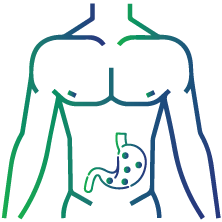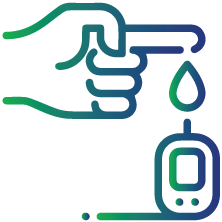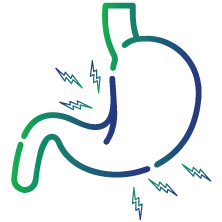
Vitamin B12 Test
About Vitamin B12 Test
Vitamin B12, also called cobalamin, is a water-soluble vitamin, mostly found in animal-based foods. It is one of the 8 B vitamins. It plays important roles in cell metabolism, red blood cell synthesis and DNA formation.
The vitamin B12 test, measures how much vitamin B12 is present in your blood. This test is performed based on your symptoms and the results of previous blood tests. A lack of vitamin B12 or a low level of this critical vitamin can lead to a number of health problems, including anaemia and issues with the nervous system.
Functions of Vitamin B12
It helps in:
· Synthesis of DNA (genetic material in all the cells)
· Synthesis of red blood cells
· Production of energy in the body
· Maintenance of nerves and brain function
· Cell metabolism
Symptoms for Vitamin B12 deficiency
A deficiency of this vitamin can lead to:

Tingling in the hands and feet

Balancing problems

A racing heart

Confusion

Dementia

Weakness

Loss of appetite
Who should get tested?
Our body doesn’t naturally produce vitamin B12. A few animal products such as fish, meat, and dairy are examples of products that contains vitamin B12. The following people are at risk of not getting enough vitamin B-12:

Older

Children

Strict vegetarians

People with lack of intrinsic factor

People with diabetes

People with stomach conditions

Pregnant women

Breast-feeding mothers
Test preparation
Fasting samples must be collected after a minimum of 10-12 hours of fasting status. During this time, only water can be consumed. The patient is advised to not drink any beverages in the morning, such as tea, coffee, or milk, until the sample collection is completed.
It is important that you tell your doctor about any medications and supplements you are taking, as some medications can affect the results, such as phenytoin.
Interpretation of results
|
Normal values |
160 to 950 picograms per milliliter (pg/mL), |
Deviation from normal levels indicates the following:
|
Results based on picograms per milliliter (pg/mL) |
|
|
Below 160 pg/mL |
Low |
|
200 to 600 pg/mL |
Normal |
|
800 pg/mL |
High |
Higher or lower than normal range vitamin B12 levels indicate borderline, intermediate, or higher-risk ranges for nervous system problems and anaemia.
Below normal range:
Vitamin B12 levels less than 200 pg/mL are considered low, and indicate vitamin B12 deficiency, pernicious anaemia, or an overactive thyroid. Neurological symptoms are common in people with low vitamin B12 levels.
Above normal range:
A vitamin B12 levels of 900 pg/mL or more is considered abnormally high and indicate liver or kidney problems, diabetes, or some form of leukaemia (blood cancer). Elevated levels of vitamin B12 are rare. Normally, excess vitamin B12 is excreted in the urine.
FAQs
What are the causes of vitamin B12 deficiency?
The below mentioned factors may lead to vitamin B12 deficiency:
· Getting not enough vitamin B12 in diet (rare, except with a strict vegetarian diet)
· Certain diseases that cause malabsorption (for example, celiac disease and Crohn disease)
· Lack of intrinsic factor, a protein that helps the intestine absorb vitamin B12
· Excess heat production
· Pregnancy
What are the health conditions that can increase B12 level?
Conditions that can increase B12 level include:
· Liver disease (Such as hepatitis)
· Myeloproliferative disorders (for example, polycythaemia vera)
· Certain type of cancers (such as chronic myelogenous leukaemia)
What are food sources for vitamin B12?
A few foods that are rich in vitamin B12 include:
· fish and seafood
· meat
· eggs
· dairy products
· fortified plant-based dairy alternatives
· fortified breakfast cereals
· fortified nutritional yeast
Does excess vitamin B12 result in toxicity? Answer:
Vitamin B12 is a water-soluble vitamin, therefore any unused vitamin is expelled from the body via the urine. As a result, excessive vitamin B12 intake from food or supplements has no negative effects in otherwise healthy people. However, before taking any high-dosage supplement, consult a doctor.
How much vitamin B12 is required regularly?
Adults (both men and women) should consume 2.4 micrograms of vitamin B12 per day, while children should consume 0.4 to 2.4 micrograms. The vitamin B12 requirement increases to 2.6 mcg during pregnancy and 2.8 mcg during lactation.
What is the turnaround time (TAT) for the results of a lipid profile test?
Test results of Vitamin B12 test are usually available after 1-2 working days, although it could take longer at times

